What you need to know about Zimbabwe's electionspublished at 21:33 BST 22 August 2023
The BBC explores key issues in a vote that will test how far Zimbabwe has come since Robert Mugabe.
Read MoreThe BBC explores key issues in a vote that will test how far Zimbabwe has come since Robert Mugabe.
Read MoreFor the latest updates, go to bbc.com/africalive
Electricity problems have led to water shortages and those with money are digging their own boreholes.
Read MoreMourners of those killed by suspected Islamist militants describe their shock at the raid's brutality.
Read More Richard Hamilton
Richard Hamilton
BBC World Service newsroom
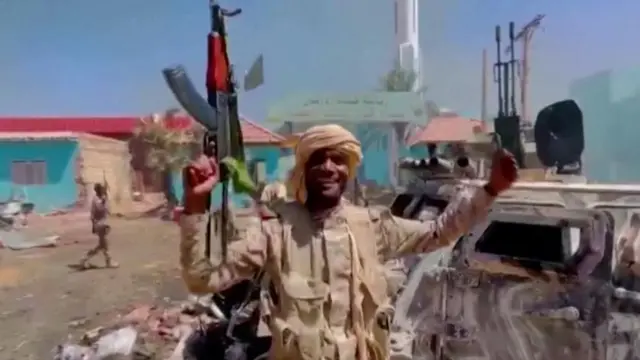 Image source, Reuters
Image source, ReutersA vicious power struggle between the military rivals started in mid-April
The latest temporary ceasefire between Sudan's rival military factions appears to have brought a lull in the fighting, following battles and air strikes overnight.
A resident in the capital, Khartoum, said the situation was calm and expressed hope that the truce might be the beginning of the end of the war.
He said people were tired of conflict, death and looting.
The 72-hour ceasefire was announced on Saturday by US and Saudi mediators.
The Sudanese army and the paramilitary Rapid Support Forces agreed to halt attacks and allow the delivery of humanitarian aid.
Previous truces have been poorly observed.
More on Sudan's conflict:
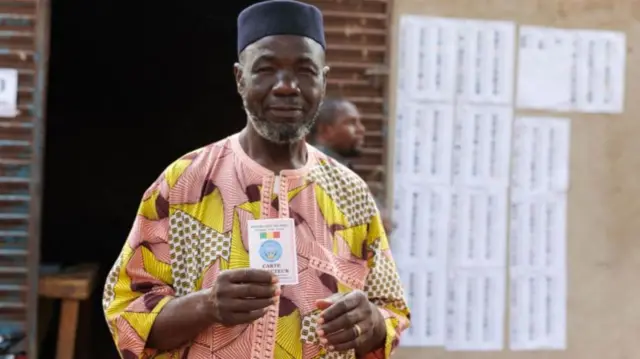 Image source, AFP
Image source, AFPMali is holding a referendum on a new constitution that would begin the process of returning the country to democratic civilian rule.
The military junta which seized power in 2020 led a second coup nine months later, unhappy with the civilians leading a caretaker government it had installed.
Coup leader Col Assimi Goïta then took over as president - and has since agreed to hand over to an elected government early next year.
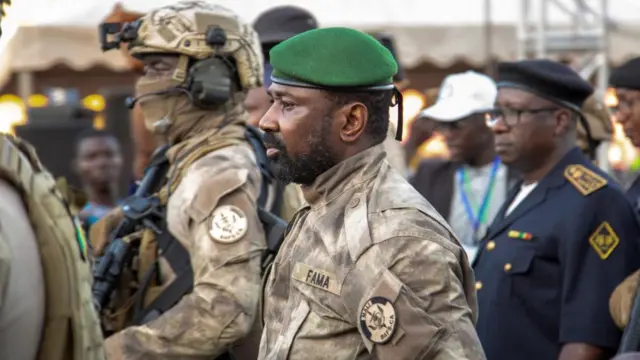 Image source, Reuters
Image source, ReutersAssimi Goïta has been campaigning for a "Yes" vote
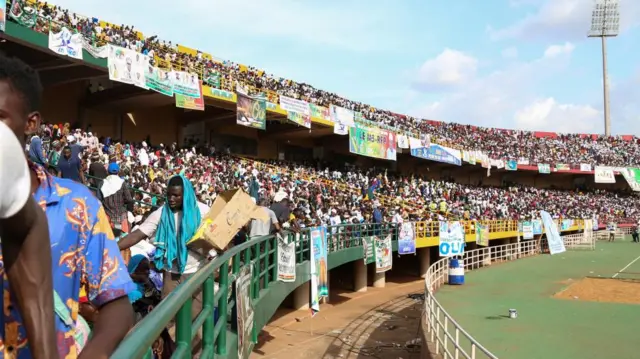 Image source, Reuters
Image source, ReutersThousands attended the final rally of the "yes" camp at a stadium in Bamako on Friday
The revised constitution includes a new second house to increase representation across Mali, which has been hit by jihadist violence and other insecurity for more than a decade.
Critics have complained that the military had no right to oversee the rewriting of the constitution which, if passed, will leave the president with too much power.
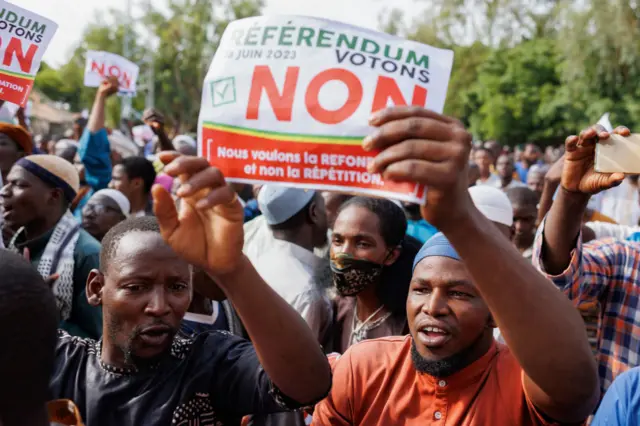 Image source, AFP
Image source, AFPThe "No" campaign's rally was organised by The Association of Imams
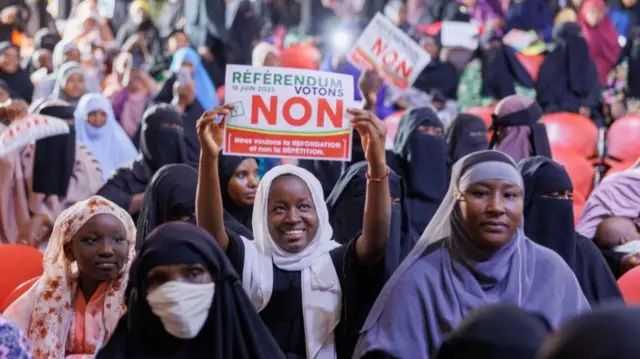 Image source, AFP
Image source, AFPIt opposes the continuation of secularism enshrined in the current constitution
Around 8.4 million people are eligible to vote and the results are expected within 72 hours.
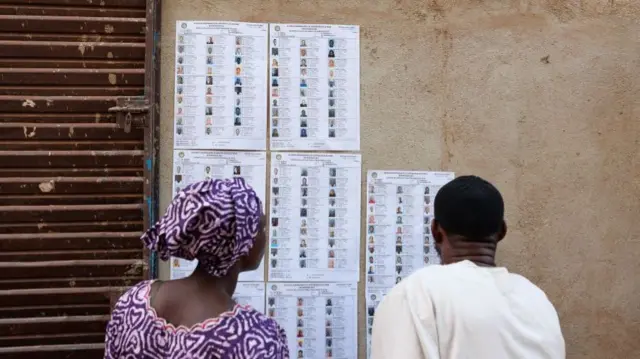 Image source, AFP
Image source, AFPVoting may not be held in some areas of the north because of continued insecurity
Twenty-five homes were destroyed in the densely populated area of Yarmouk, where civilians are trapped.
Read MoreCyril Ramaphosa and other African leaders met the Ukrainian and Russian presidents in their peace bid.
Read MoreAttackers linked to the Islamic State group used machetes and burned a dormitory during the attack.
Read MoreMali's military rulers accuse the UN of fuelling tensions as jihadist violence continues.
Read MoreThe Ngonnso statue was looted from Cameroon in 1902 and has been on display in a Berlin museum.
Read MoreSue Galloway, originally from Zimbabwe, is honoured for teaching fishing to youngsters in Northamptonshire.
Read MoreSouth African President Cyril Ramaphosa said African countries are prepared to participate further in a peace pact between Ukraine and Russia.
Read MoreWe'll be back on Monday
That's all from the BBC Africa Live team for now. There will be an automated news feed here until Monday morning.
You can also follow the latest at BBCAfrica.com and listen to the new BBC Focus on Africa podcast for more on the big topics in the news.
A reminder of the wise words:
Quote MessageOne cannot clap with a single hand."
An Amharic proverb sent by Ayele Admasu in Adama, Ethiopia
Click here to send us your African proverbs.
And we leave you with this photo of Maasai men preparing for a cultural festival in Kenya, one of our favourite shots from our gallery of the week's best photos.
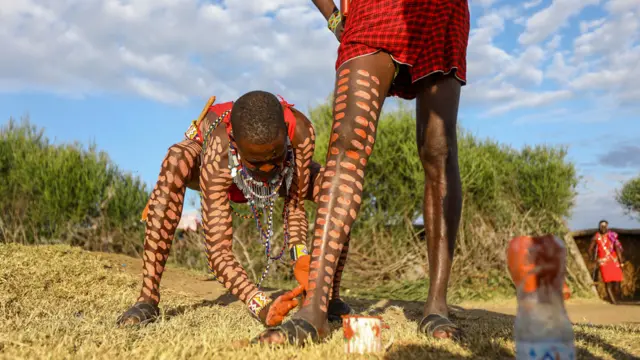 Image source, EPA
Image source, EPAKenyans in the coastal city of Mombasa have released hatchling turtles into the Indian Ocean to raise awareness on World Sea Turtle Day.
They gathered at Nyali Beach to see them swim off:
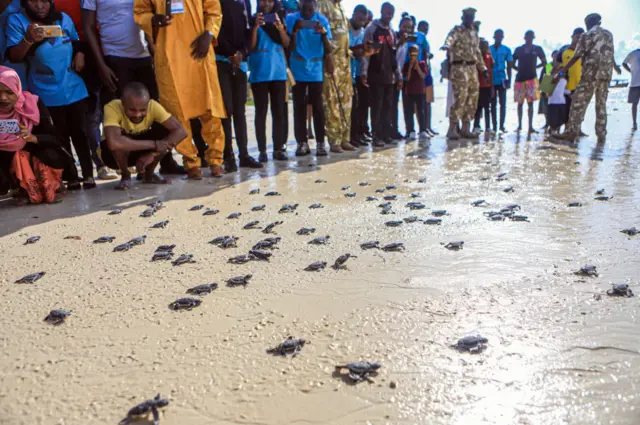 Image source, Getty Images
Image source, Getty Images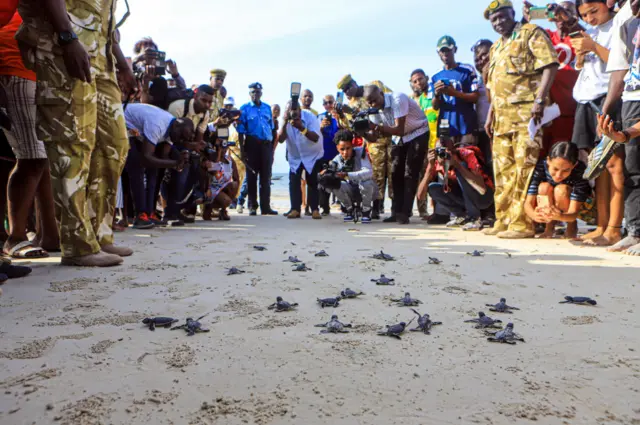 Image source, Getty Images
Image source, Getty ImagesAccording to the World Wide Fund for Nature (WWF), six out of seven species of marine turtle are threatened with extinction.
This is because around eight million tonnes of plastic is dumped into the sea every year.
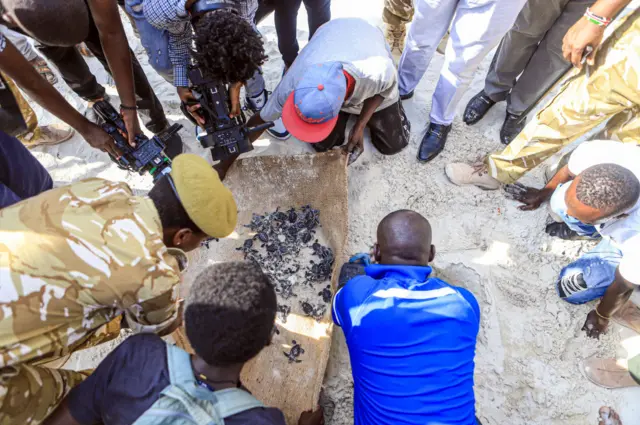 Image source, Getty Images
Image source, Getty Images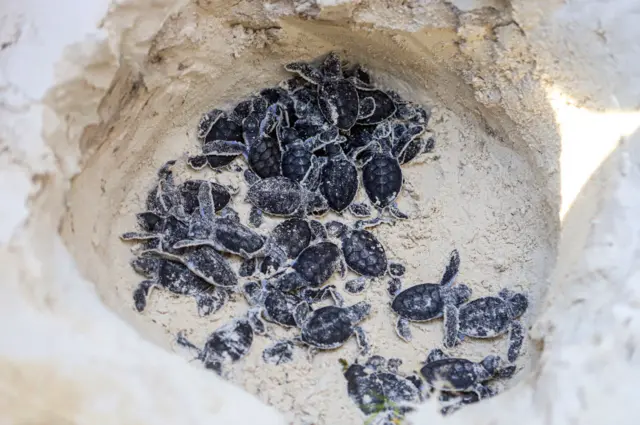 Image source, Getty Images
Image source, Getty ImagesEstimates suggest that as few as one in 1,000 eggs survive to adulthood - and beaches strewn with rubbish can prevent hatchlings reaching the sea, the organisation says.
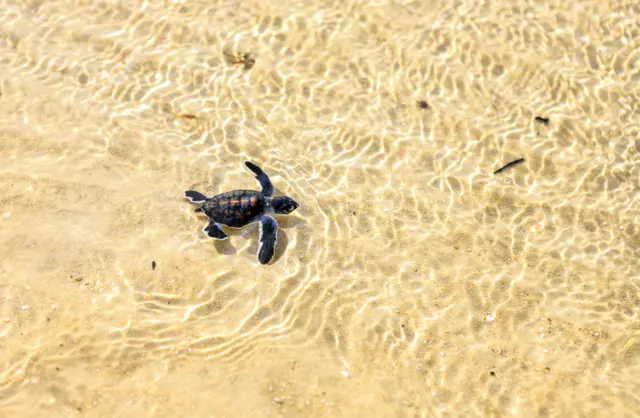 Image source, Getty Images
Image source, Getty Images Will Ross
Will Ross
Africa editor, BBC World Service
Mali's government has called for the withdrawal of the UN peacekeeping mission which it says has been a failure.
Foreign Minister Abdoulaye Diop said he wanted the UN Security Council to approve the withdrawal without delay.
Over a decade ago jihadist fighters and Tuareg rebels seized swathes of northern Mali.
Since then thousands of UN troops have been based in the country.
Despite their presence the security situation has steadily deteriorated and hundreds of thousands of people have been forced from their homes.
There have been two coups since 2020 and after falling out with France, the military leaders have turned to Russia for help in the fight against Islamist militants.
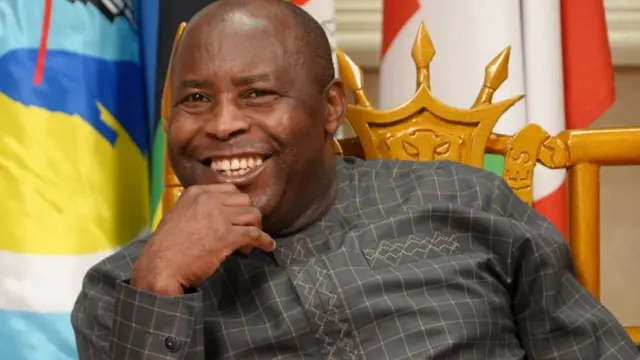
President Evariste Ndayishimiye was relaxed and confident as he chatted to the BBC
It is just over three years since Burundi's President Pierre Nkurunziza died in office aged 55. It was a great shock to the nation, though he was already preparing to step down and hand over power to Evariste Ndayishimiye.
In his first interview with the BBC, his successor shows how he has tried to mend fences in the international arena.
Unlike Mr Nkurunziza, who was hostile to the media and banned the BBC at one stage, Mr Ndayishimiye was relaxed and chatty with the BBC interviewers from our Swahili and Great Lakes services.
As current chair of the East African Community, he spoke with confidence about the recent deployment of the regional force to neighbouring Democratic Republic of Congo, saying it had had more success than UN peacekeepers in stabilising the rebel-plagued area.
He said relations with neighbouring Rwanda had improved greatly - they had plummeted to an all-time low in 2015 when its neighbour was accused of backing a coup plot to unseat Nkurunziza - and said talks were ongoing with Kigali to get the suspected plotters extradited.
He did not budge, however, on the issue of the UN and human rights, saying he would not reverse Nkurunziza’s decision to ban the UN human rights rapporteur to Burundi.
Though he did invite the UN Human Rights Council to come and discuss what aspects of human rights it felt needed to be addressed.
The BBC ban was lifted in 2019.
Priya Sippy
BBC News
The number of men seeking paternity tests in Uganda has recently increased by 70% Uganda’s spokesperson for the Ministry of Internal Affairs, Simon Mundeyi, says.
Three years ago, three tests per month were carried out, now it is close to 100 every month, Uganda's Monitor newspaper quotes him as saying, external.
The government said it was unsure why these numbers were rising.
“Some men now are now waking up to the fact that they are looking after children that do not actually belong to them,” Mr Mundeyi told NTV Uganda.
He mentioned that out of 12 results that they had got back this week so far, only two confirmed the father was the biological parent.
Speaking to NTV Uganda, Josephine Kasaato, president of the Mothers Union in Buganda region, said there should be counselling to support families that had gone through the testing.
Tests are carried out at the Government Analytical Laboratory in the capital, Kampala, and cost $100 (£78).
 DJ Edu
DJ Edu
Presenter of This Is Africa on BBC World Service
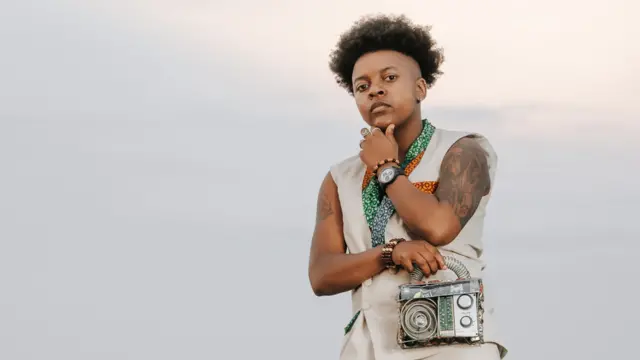 Image source, Grace Tembo
Image source, Grace TemboChmba loved to make mixed tapes when she was young
Chmba is a DJ and music producer from Malawi who has achieved an international profile few can match.
At an early age she started to pull apart her family’s cassettes in order to extract a track that she wanted to include in her own mix tapes: “I was whipped a couple of times for tearing apart a mix which I shouldn’t have!”
She has come a long way since then. She has DJed for none other than the queen of pop, Madonna on one of her many visits to Malawi.
“She walks into the room and looks at me, full eye contact and I’m like yikes, what have I done?”
Chmba needn’t have worried, Madonna just wanted to overrule the party organiser who had told Chmba to only play cool jazz: “She said, ‘Can you play some Afrobeats, pump it up, just do you!’ They were supposed to dance until around 12am but the party kept going until 4am!”
Clearly Chmba made an impression. A few months after that Madonna summoned her to Los Angeles to DJ for her at an Oscars afterparty with A-list celebrities in attendance.
She has subsequently opened for Grammy Award winners including Angélique Kidjo and Nile Rogers.
Chmba has been named Glamour Magazine’s woman of the year and her charitable work has earned her recognition from Forbes and the Bill & Melinda Gates Foundation, among others.
Her brand new EP, Okongola Caucus, drops on Friday 16 June.
“I’d say it’s Afrofuture sounds. Some songs lean towards more of a bass house, other towards Afrobeats, but all of the songs have samples of very traditional Malawian drums and then you’ll also hear electronic synths as well.”
You can hear my conversation with Chmba on This is Africa this Saturday, on BBC World Service radio - available online - and on partner stations across Africa.
Analysis
Marco Oriunto
BBC Focus on Africa podcast
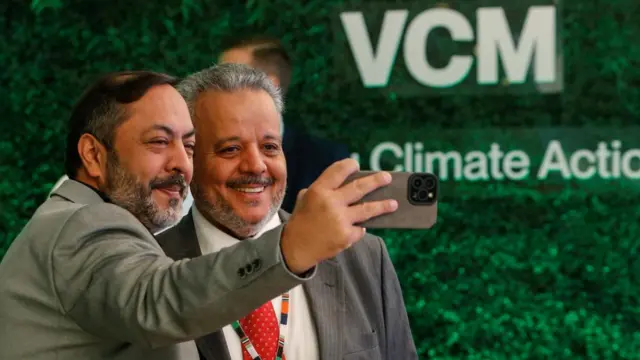 Image source, Reuters
Image source, ReutersExperts argue that buying carbon credits should not be an excuse to keep emitting
Africa may be earning huge amounts of money from selling carbon credits, but whether it will prevent global temperatures rising is debatable.
This analysis - from BBC environment correspondent Navin Khadka - comes after Saudi Arabia purchased more than two billion tonnes of carbon credits at an auction in Kenya earlier this week.
Carbon offsets help companies reach their target of net-zero without having to limit their own emissions.
Through the carbon credit system, they pay other countries or communities who have avoided carbon emissions (by using clean stoves, for example) or by capturing and storing carbon from the atmosphere via protected and restored forests.
“If buyers keep on buying credits and keep on emitting, will that help the bigger cause of limiting our temperature rise to 1.5C is the question widely asked. The fear is it might worsen the situation if polluters use it as a licence to carry on with business as usual,” Khadka told the BBC Focus on Africa podcast.
At the start of Wednesday’s auction, Kenyan Trade Minister Moses Kuria pointed out how countries like Kenya had already paid a high price because of the rest of the world’s carbon emissions.
“Just last year, the country lost animals worth more than $600m [£468m] as a result of drought which is closely associated with climate change,” he tweeted.
According to our reporter, the global carbon credit market is forecast to grow to up to $50bn by 2023, much of which will go towards planting trees and green energy initiatives.